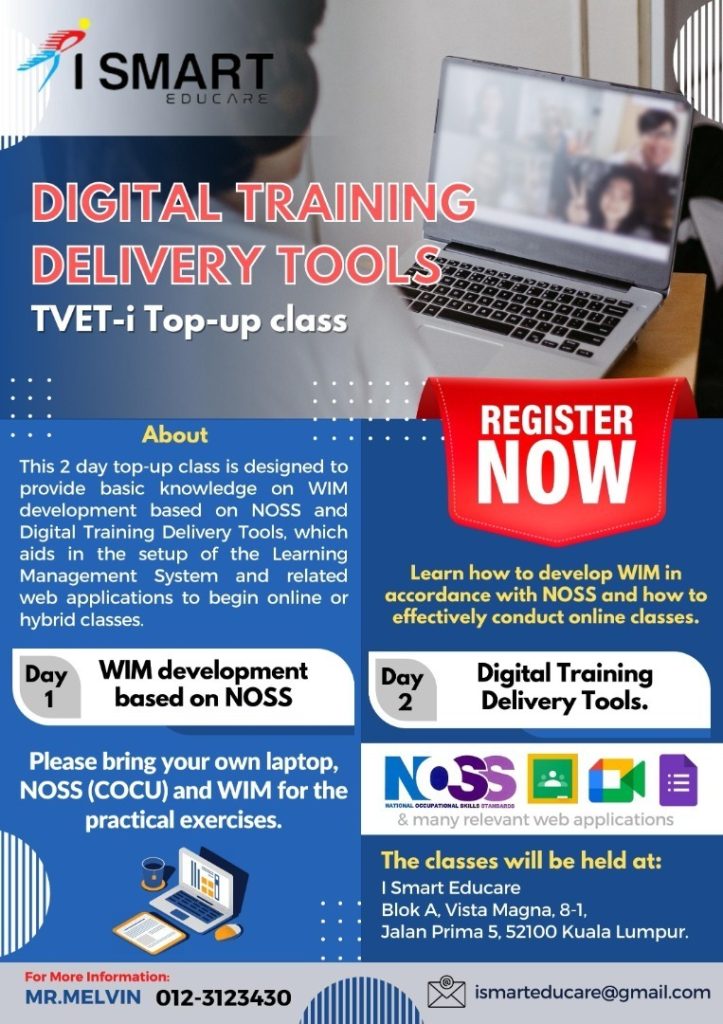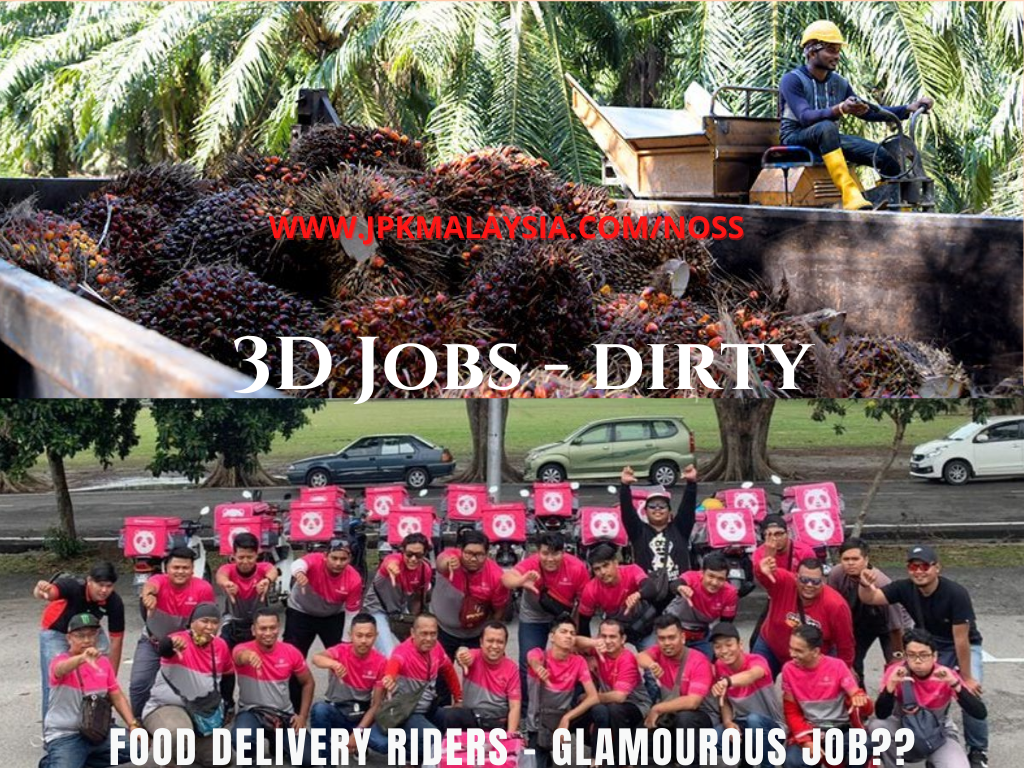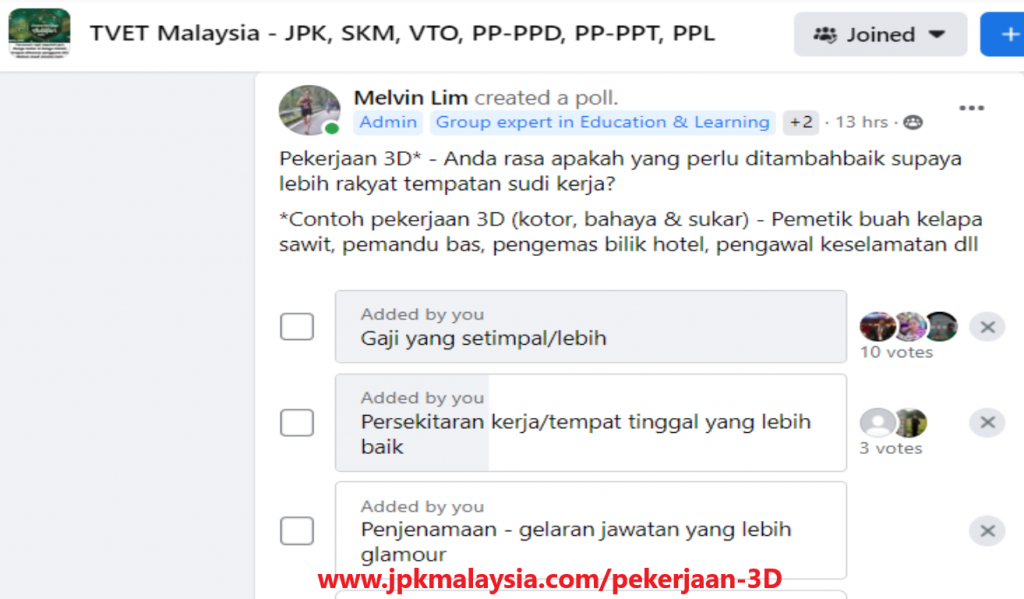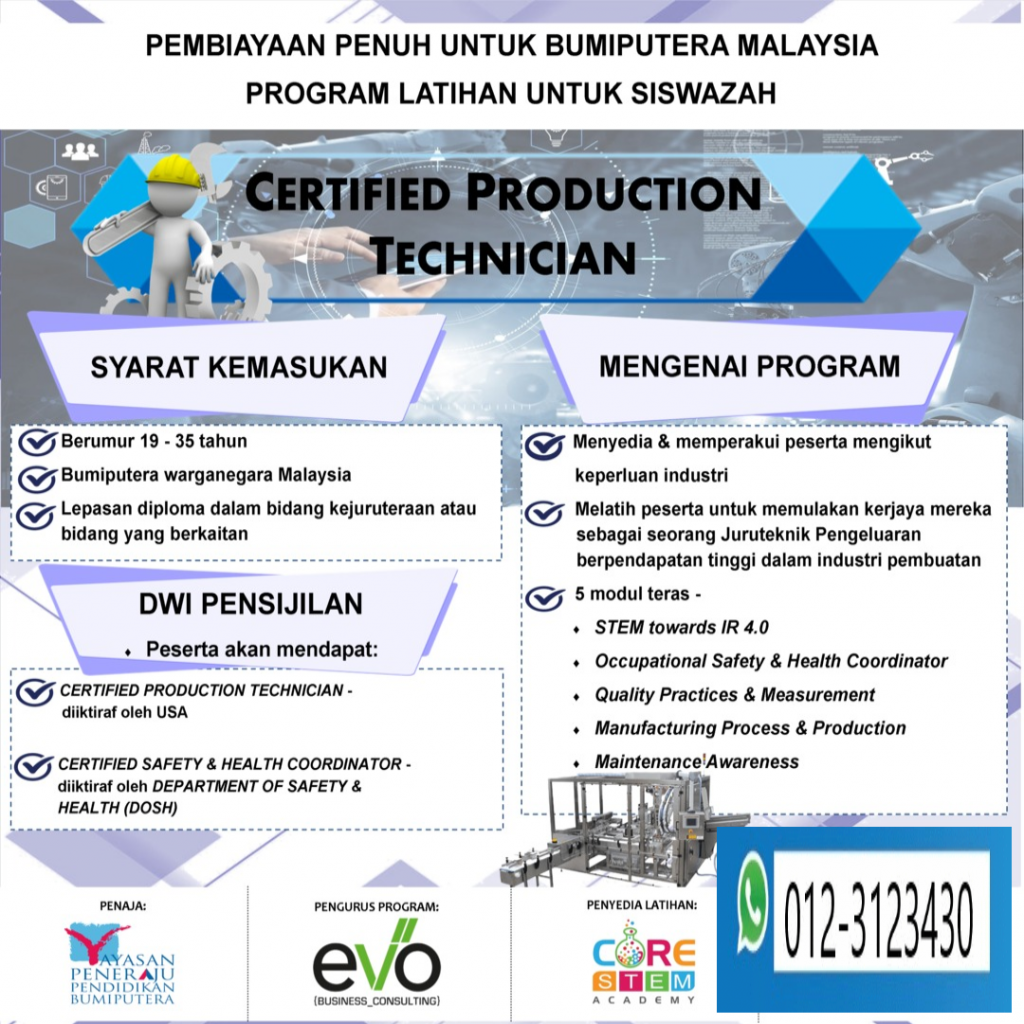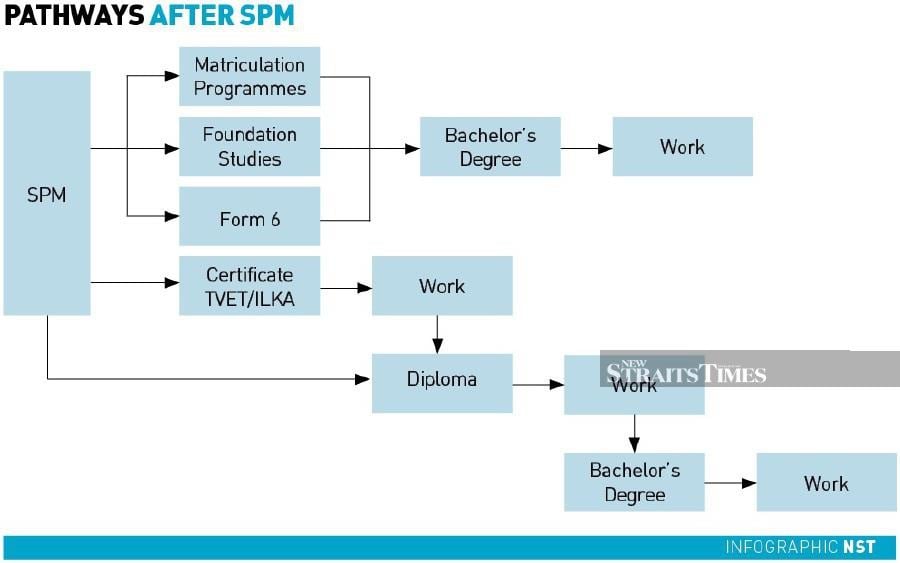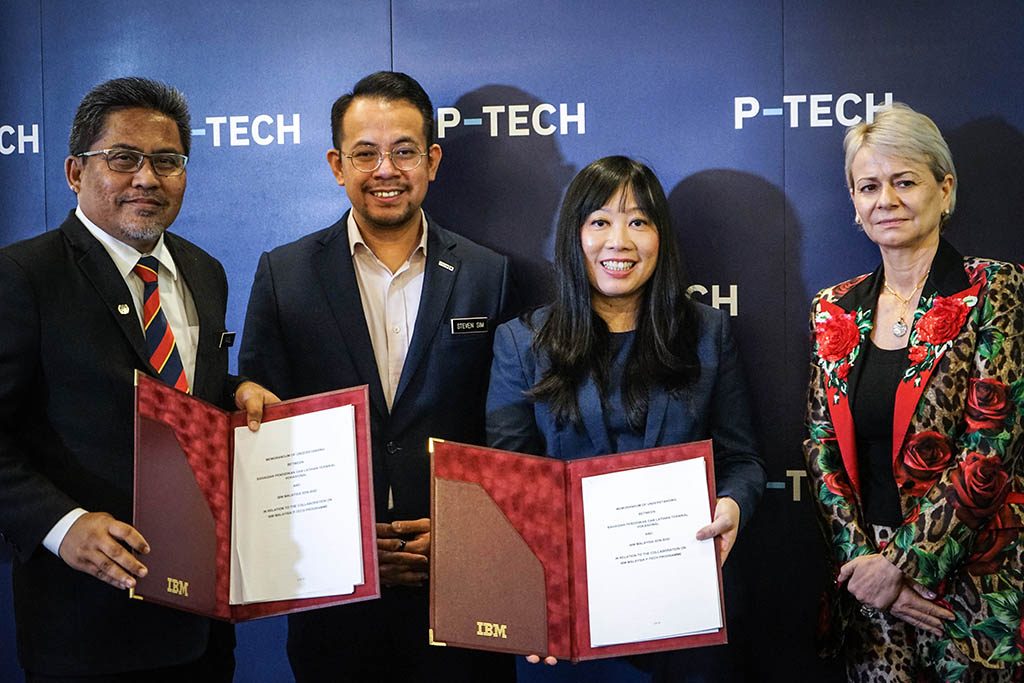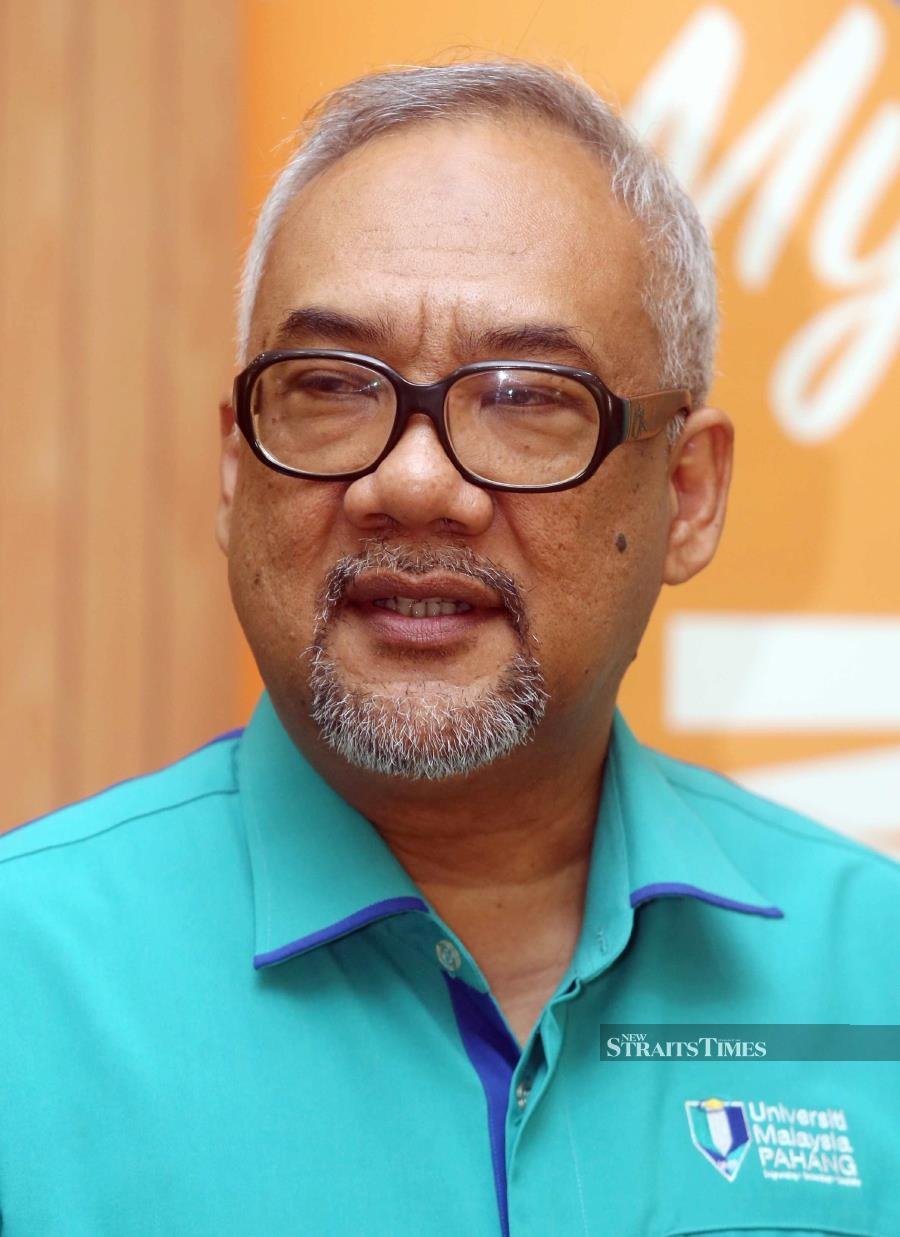TVETi (TVET Instruction)
TVETi adalah singkatan kepada TVET Instruction atau dalam Bahasa Malaysia dikenali sebagai Pengajaran TVET.
Kod NOSSnya adalah P853-002-4:2021, Tahap 4@Diploma Kemahiran Malaysia bidang Pengajaran TVET.
Pengajar TVET adalah individu yang mampu menjalankan latihan berkaitan pekerjaan yang berkesan untuk membantu belia dan dewasa dalam pembelajaran sepanjang hayat, latihan pekerjaan dan pembangunan kemahiran. Mereka terlatih secara teknikal, mahir dalam trend industri dan amalan terbaik serta kecekapan dalam menunjukkan kualiti latihan yang berprestasi tinggi
untuk dunia pekerjaan. Dalam konteks Malaysia, pengajar kemahiran adala seorang yang bertanggungjawab untuk latihan kemahiran dengan membimbing, menyelia dan menilai keupayaan pelatih untuk mengasimilasikan aspek teori dan praktikal latihan (The Commissioner of Law Revision Malaysia, 2006).
Secara ringkasnya, pengajar TVET adalah kunci pemboleh (key enabler) yang menentukan kemahiran tenaga kerja masa depan (UNESCO-UNEVOC, 2020).
Secara amnya, pengajar TVET Malaysia ditetapkan untuk melatih secara formal dan tidak formal pembelajaran di institusi berasaskan latihan@Pusat Bertauliah JPK untuk beberapa kementerian persekutuan yang memiliki, membiayai dan mengendalikan sektor awam TVET, termasuk, tetapi tidak terhad kepada:
a) Kementerian Sumber Manusia: Institut Latihan Perindustrian (ILP), Lanjutan Pusat Latihan Teknologi Tinggi (ADTEC), Institut Teknikal Jepun-Malaysia (JMTI) dan Pusat Latihan Pengajar dan Kemahiran Lanjutan (CIAST);
b) Kementerian Belia dan Sukan: Institut Kemahiran Belia Negara (IKBN), Institut Kemahiran Tinggi Belia Negara IKTBN, Akademi Kemahiran Belia Golf (AKBG);
c) Kementerian Pertanian dan Industri Makanan: Institut Pertanian, Institut
Perikanan dan Institut Veterinar;
d) Kementerian Kemajuan Luar Bandar dan Wilayah: Kolej Kemahiran Tinggi Mara (KKTM), Institut Kemahiran Mara (IKM), MARA-Japan Industrial Institut
(MJII), GIATMARA;
e) Kementerian Pelancongan dan Kebudayaan: Institut Latihan Pelancongan;
f) Kementerian Kerja- Akademi Binaan Malaysia dan
g) Kementerian Pertahanan: Institut Perhebat.
Selain itu, agensi awam lain seperti Bahagian Pendidikan dan Latihan Teknikal Vokasional (BPLTV), Kementerian Pendidikan; Politeknik dan Komuniti
Kolej, Rangkaian Universiti Teknikal Malaysia (MTUN); Kementerian Pendidikan Tinggi dan juga institut latihan swasta turut menyumbang persediaan sedemikian untuk TVET dan pembangunan modal insan untuk mempercepatkan pertumbuhan ekonomi. Memandangkan TVET memainkan peranan penting dalam pembangunan ekonomi negara, Kerangka Kelayakan Malaysia (MQF) dibangunkan untuk menyelaras dan memantau kemajuan TVET untuk memenuhi permintaan industri dan membantu peranan dan fungsi pengajar TVET di negara ini.
Jabatan Pembangunan Kemahiran (JPK), Kementerian Sumber Manusia dan Agensi Kelayakan Malaysia (MQA) adalah agensi/kementerian yang mengharmonikan dan mengukuhkan tadbir urus dan institusi mekanisma untuk pelaksanaan TVET dalam berkaitan akreditasi dan jaminan kualiti dalam tiga tonggak utama laluan TVET seperti yang digambarkan dalam rajah di bawah.
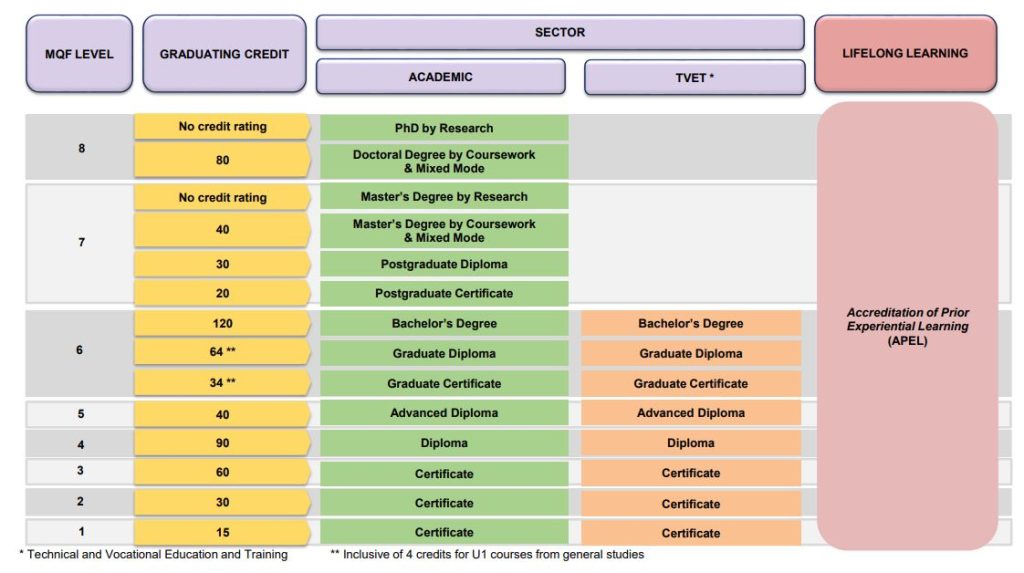
Rasional Pembangunan NOSS TVETi
Ini adalah semakan NOSS untuk Operasi Latihan Vokasional Tahap 3 (I-031-
3:2014) dan Pelaksanaan Pendidikan & Latihan Vokasional Tahap 4 (I-031-
4:2014) atau Eksekutif Latihan Vokasional Tahap 4 (I-031-4).
Rasional untuk pembangunan NOSS Pengajaran TVET adalah berdasarkan amalan sebenar daripada maklum balas pemain industri yang mendapati NOSS VTO sedia ada harus mempertimbangkan intervensi terkini dalam pelaksanaan latihan. Dengan cadangan Keusangan Operasi Latihan Vokasional (VTO) Tahap 3, JPK mempertimbangkan untuk menaik taraf kepada TVETi – Pengajaran TVET Tahap 4 berdasarkan garis panduan sedia ada. panduan sedia ada.
NOSS ini dibangunkan sebagai pelengkap kepada NOSS sedia ada untuk melengkapkan personel dengan kaedah dan teknik pengajaran. Dengan permintaan semasa yang luas dalam pelbagai aktiviti kerja teknikal dan profesional yang kompleks seperti platform eLearning, pekerjaan semasa memerlukan pelbagai konteks dengan tanggungjawab peribadi dan autonomi yang besar.
Oleh itu, NOSS TVETi yang dicadangkan adalah untuk meningkatkan kecekapan semasa sehingga standard yang lebih tinggi dan panel pembangunan NOSS telah sebulat suara bersetuju untuk menetapkan TVETi di Peringkat Diploma dan memerlukan internship di Pusat Bertauliah JPK.
Apa kaitan TVETi dengan Anda?
Kelayakan sebagai Pegawai Penilai (PP)* – Mengajar dan Menilai di Pusat Bertauliah JPK, awam ataupun swasta.
* Anda juga perlu sijil induksi PP-PPD-PPB dan Sijil Kemahiran Malaysia (SKM) dalam program berkaitan
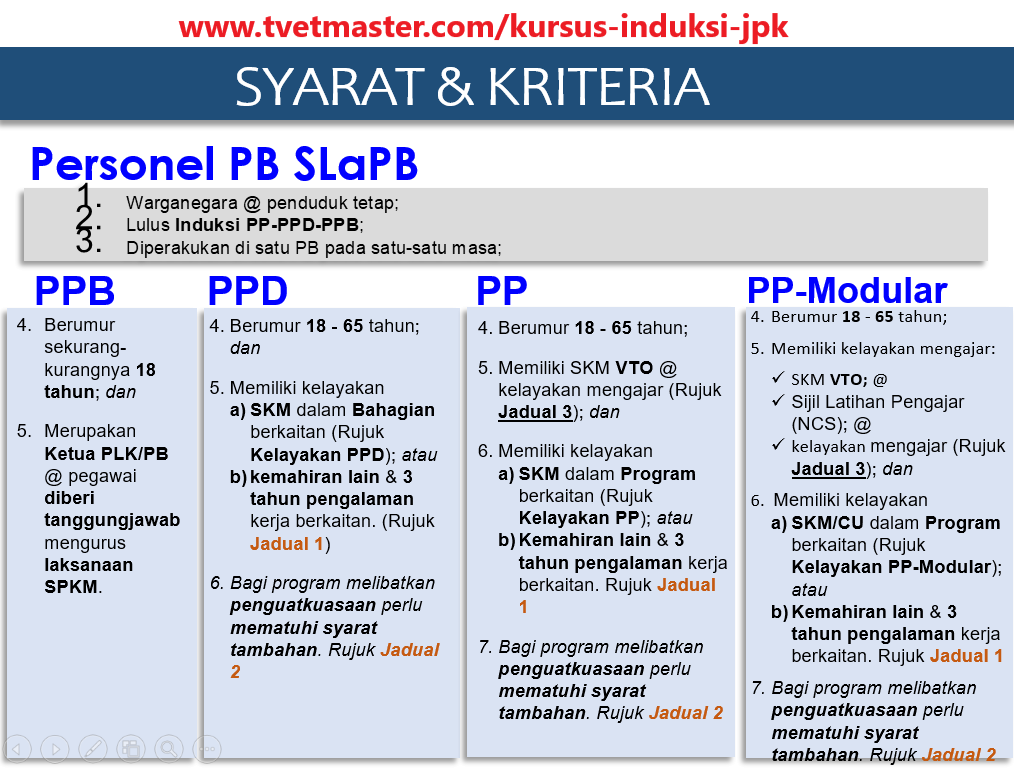
Bagaimana Nak Ambil Kursus TVETi? (Sepenuh Masa)
Tempoh pelaksanaan kursus ini adalah selama 9 bulan menggunapakai NOSS Pengajaran TVET (P853-002-4:2021) sebagai garis panduan asas. Pelaksanaan kursus adalah 3 bulan teori (Metodologi) di CIAST dan 6 bulan latihan internship di Institut Latihan Kemahiran Awam atau Swasta. Pelajar yang tamat pengajian dengan jayanya akan dianugerahkan DIPLOMA PENGAJARAN TVET (TVET I) TAHAP 4 daripada Jabatan Pembangunan Kemahiran (JPK).
Boleh mohon di laman Web CIAST (www.ciast.gov.my) ; atau https://permohonan.ciast.gov.my/calon/application.jsp
Sebarang pertanyaan sila email ke pengambilan@ciast.gov.my atau hubungi Unit Pengambilan Pelajar di talian 03-55438225/8226/8295
Jika anda di Sarawak, boleh mohon di sini.
Syarat Permohonan
- Warganegara Malaysia berumur 20 – 35 tahun pada tahun semasa
- Lulus dalam SPM atau SPMV dengan lulus matapelajaran Bahasa Malaysia dan Sejarah (bagi calon SPM Tahun 2013 dan ke atas)
- Mempunyai sekurang- kurangnya Sijil Kemahiran Malaysia (SKM Tahap 3); atau Diploma Kemahiran Malaysia (DKM); atau Diploma Lanjutan Kemahiran Malaysia (DLKM) dalam bidang NOSS yang berkaitan
TVETi Melalui PPT (Pengalaman Mengajar)
Sekiranya anda:
1. Berumur 20 tahun ke atas;
2. Ada pengalaman mengajar bidang kemahiran >5 tahun;
3. LULUS SPM/SPMV
Anda boleh ikuti kursus INTENSIF TVETi 5 hari di CIAST sahaja (RM600).
Namun, masih perlu bangunkan portfolio dan mohon melalui www.myspike.my dengan bayaran yuran permohonan kepada JPK sebanyak RM500 sahaja.
Dah ada Sijil VTO - Macam Mana Nak Mohon?
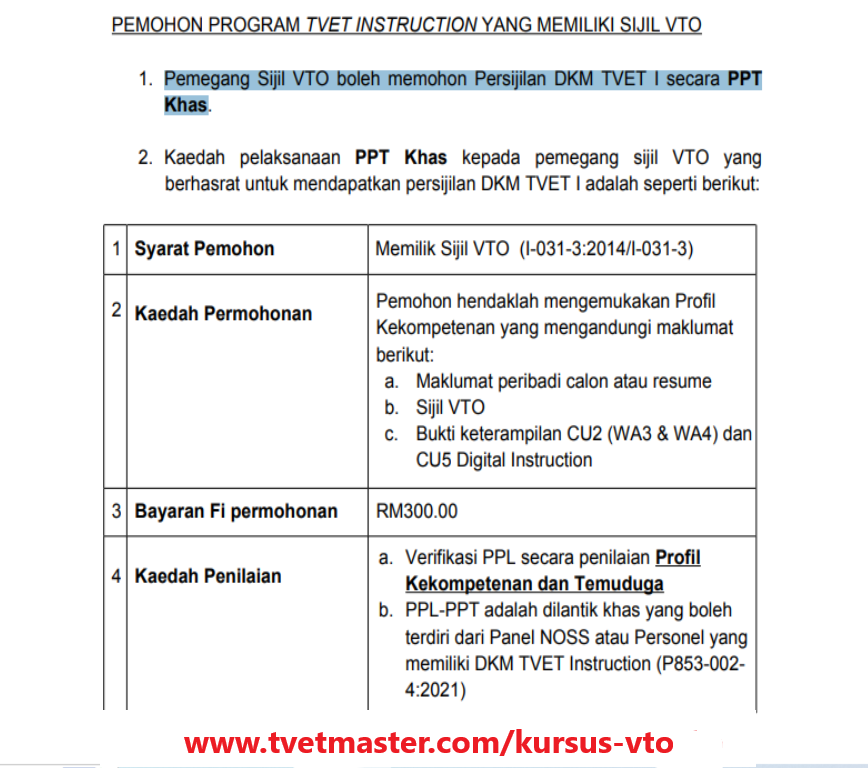
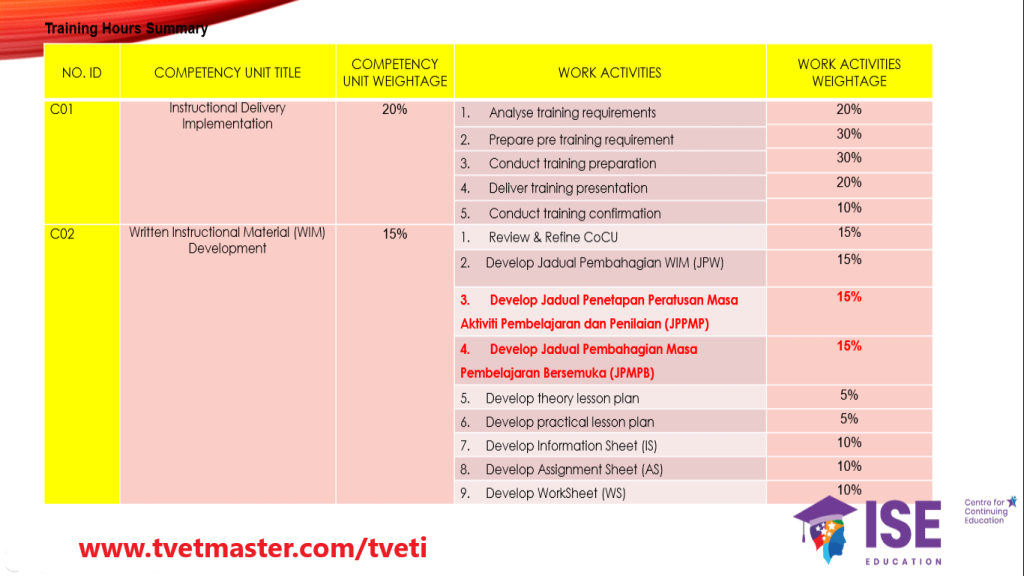
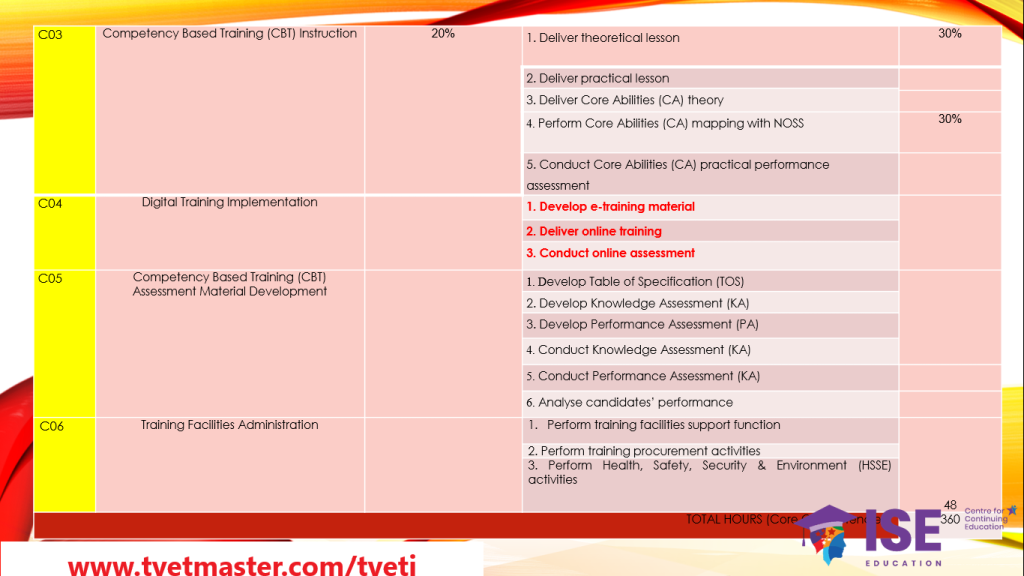
Sekiranya anda sudah lama tidak membangunkan WIM, pengetahuan/kemahiran untuk C02 (WA3&4) dan/atau C04 (Digital Training Implementation) tidak kukuh, anda digalakkan untuk ikuti kursus TVETi Top Up yang mengajar anda 2 C0 tersebut supaya anda lebih bersedia untuk menghadapi Penilaian Amali TVETi nanti.

